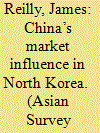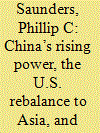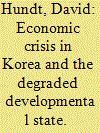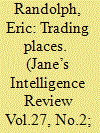|
|
|
Sort Order |
|
|
|
Items / Page
|
|
|
|
|
|
|
| Srl | Item |
| 1 |
ID:
134700


|
|
|
|
|
| Summary/Abstract |
North Korea’s deepening economic interactions with China have encouraged the former’s localized trends toward a more market-oriented and externally engaged society. This article compares China’s engagement strategy to South Korea’s “Sunshine Policy” and then assesses China’s transformational influence on North Korean institutions, cross-border cooperation, businesspeople, and consumers.
|
|
|
|
|
|
|
|
|
|
|
|
|
|
|
|
| 2 |
ID:
134993


|
|
|
|
|
| Summary/Abstract |
The Obama administration’s “rebalance to Asia” has many elements of continuity with past policy, including recognition that rapid growth and economic dynamism have greatly expanded the Asia-Pacific region’s economic and strategic weight and importance to U.S. interests. Administration officials emphasize that the rebalance involves a comprehensive diplomatic, economic, and military approach that pays more attention to India, Southeast Asia, and regional institutions; that the timing was dictated largely by the need for clear priorities to guide force development in an era of declining spending; and that demand by U.S. allies and partners for an increased U.S. commitment to the region played an important role in shaping the rebalance. U.S. diplomatic, economic, and military efforts to implement the rebalance demonstrate a significant increase in strategic attention to the Asia-Pacific region, matched by commitments of diplomatic, economic, and military resources, including the time of senior U.S. leaders. Chinese officials and scholars have reacted by expressing concern and skepticism about the stated U.S. rationale, lamenting the “lack of strategic trust” between Washington and Beijing, urging greater respect for Chinese “core interests,” and stressing negative consequences of the rebalance for Asian security (especially its supposed role in emboldening U.S. allies and partners to challenge Chinese maritime territorial claims). At the same time, they have redoubled efforts to stabilize Sino-U.S. relations and to build a “new type of great power relations.” A key implementation challenge is making the rebalance robust enough to reassure U.S. allies and partners of the U.S. capability and will to maintain its presence in Asia over the long-term, while not alarming Chinese leaders to the point where they forego cooperation with Washington. U.S. and Chinese leaders should work to expand and deepen the scope of bilateral cooperation on common interests, while seeking ways to limit and manage competitive aspects of U.S.-China relations.
|
|
|
|
|
|
|
|
|
|
|
|
|
|
|
|
| 3 |
ID:
134246


|
|
|
|
|
| Summary/Abstract |
This article analyses the Korean developmental state since the late 1990s, and argues that the state has continued to play a weighty role in the economy. The state guided industrial and financial restructuring after the Asian economic crisis, and intervened to stimulate the economy during the 2008 global financial crisis. In doing so, state elites have displayed a distinctive form of economic leadership that is largely consistent with the developmental state. Rather than focusing predominantly on performance-related indicators of state strength such as growth rates, this article analyses the deeper aspects of the developmental state, specifically its internal functions and its collaboration with business. The article brings politics back into analysis of the developmental state by questioning the assumption that strong economic performance is necessary for the maintenance of close ties between the state and chaebol. Instead, economic performance is better understood as a predictor of patterns of conflict and cooperation. Long-standing ties between the state and big business have endured two significant economic crises, even if the performance of the developmental state has been degraded compared to earlier decades.
|
|
|
|
|
|
|
|
|
|
|
|
|
|
|
|
| 4 |
ID:
135322


|
|
|
|
|
| Summary/Abstract |
This paper investigates the short- and long-run impact of the real exchange rate on trade balance in Vietnam from 2000 to 2010. The Autoregressive Distributed Lag (ARDL) method is used to explore the long-run impact, and a corresponding Error Correction Model (ECM) based on a long-run cointegration equation examines the impact on trade balance when a real depreciation of the VND has occurred. An Impulse response function based on the ECM exhibits that trade balance takes on a J-curve pattern in the event of a permanent depreciation.
|
|
|
|
|
|
|
|
|
|
|
|
|
|
|
|
| 5 |
ID:
136671


|
|
|
|
|
| Summary/Abstract |
Development cooperation is an important dimension of international relations, thus has become an integral part of the foreign policy of many countries. Indonesia has always aspired to be a global player, despite of its limitations. As SBY has always shown keen interest in foreign policy, during his tenure, Indonesia embarked on a more serious effort to become an active player in international development cooperation. This arncle discusses the efforts taken by the Government of Indonesia to advance its role in the international development cooperation architecture during the Susilo Bambang Yudhoyono presidency, in particular in the context of development cooperation being carried out as a tool for foreign policy. This article argues that although Indonesia has tended to consider development cooperation as a useful tool of foreign policy, a lot of work is clearly to be done. Development cooperation is not yet closely aligned with the realization of Indonesia’s economic objectives. If a country manages to use development cooperation for both strengthening its soft power (image) and promoting more tangible interests, it can be regarded as pursuing a “smart power” strategy.
|
|
|
|
|
|
|
|
|
|
|
|
|
|
|
|
| 6 |
ID:
134909


|
|
|
|
|
| Summary/Abstract |
Scholars remain divided about how Western governments handled the issue of proliferation during Iran’s turn toward nuclear technology in the seventies. The present essay provides an interpretation that takes into account economic strategy during the global petroleum crisis. Rather than focus on the dangers of proliferation, European and American scientists and diplomats encouraged Iran to build a nuclear-intensive future, laying the foundation of Iran’s controversial nuclear community. Western nations used the promises of the Treaty on the Non-Proliferation of Nuclear Weapons (NPT) to persuade Iran to commit itself to long-term capital expenditures in the nuclear realm, as a coordinated strategy for breaking the power of the petroleum cartel. However, the politics of nonproliferation by the mid-seventies frustrated Western governments’ plans to use the NPT in this way. Parties on both sides gradually learned that Iran’s goal of creating a knowledgeable nuclear community in Iran had become incompatible with the changing Western interpretation of the NPT.
|
|
|
|
|
|
|
|
|
|
|
|
|
|
|
|
| 7 |
ID:
136502


|
|
|
|
|
| Summary/Abstract |
Most explanations of economic growth focus on conditions or incentives at the global or national level. They correlate prosperity with factors such as geography, demography, natural resources, political development, national culture, or official policy choices. Other explanations operate at the industry level, trying to explain why some sectors prosper more than others. At the end of the day, however, it is not societies, governments, or industries that create jobs but companies and their leaders. It is entrepreneurs and businesses that choose to spend or not, INVEST or not, hire or not.
|
|
|
|
|
|
|
|
|
|
|
|
|
|
|
|
| 8 |
ID:
135203


|
|
|
|
|
| Summary/Abstract |
For much of the twentieth century, leaders and policymakers around the world viewed the strategic importance of trade, and of international economic policy more generally, largely through the lens of military strength. They believed that the role of a strong economy was to act as an enabler, supporting a strong military, which they saw as the best way to project power and influence. But in recent decades, leaders have come to see the economic clout that trade produces as more than merely a purse for military prowess: they now understand prosperity to be a principal means by which countries measure and exercise power.
|
|
|
|
|
|
|
|
|
|
|
|
|
|
|
|
| 9 |
ID:
136381


|
|
|
|
|
| Summary/Abstract |
Myanmar has secured multi-billion dollar trade agreements with China despite a delicate relationship. Eric Randolph examines the political and economic impact of this accord, and how it might affect Myanmar’s attempts to diversify trade and investment partners.
|
|
|
|
|
|
|
|
|
|
|
|
|
|
|
|
|
|
|
|
|